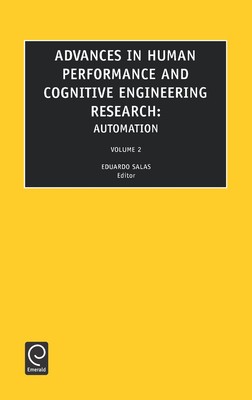
- We will send in 10–14 business days.
- Publisher: Jai Press Inc.
- ISBN-10: 0762308648
- ISBN-13: 9780762308644
- Format: 15.6 x 23.4 x 1.6 cm, hardcover
- Language: English
- SAVE -10% with code: EXTRA
Automation (e-book) (used book) | bookbook.eu
Reviews
Description
We live in an ever complex, dynamic and technological-based world. A world where industries, businesses and agencies rely ever increasingly on automated systems to maintain efficiency, increase productivity, minimize human error or gain a competitive edge. Moreover, automation is now seen by many organizations as the solution to human performance problems. These organizations continue to invest significant resources to implement automated systems wherever possible and there is no doubt that automation has helped such organizations manage their sophisticated, information-rich environments, where humans have limited capabilities. Therefore, automation has helped to improve industrial and commercial progress to the extent that organizations now depend upon it for their own benefit. However, new and unresolved problems have arisen as more individuals, groups and teams interact with automated systems. Hence, the need and motivation of this volume. The chapters contained in this volume explore some of the key human performance issues facing organizations as they implement or manage automated systems. Dealing with a range of topics, from how to design optional use, avoiding misuse, to creating training strategies for automated systems, this volume also explores which theories may help us understand automation better and what research needs to be conducted. This publication attempts to illustrate how human performance research on automation can help organizations design better systems and also hopes to motivate more theoretically-based but practically-relevant research in the technological-based world of the 21st century.
EXTRA 10 % discount with code: EXTRA
The promotion ends in 19d.18:09:14
The discount code is valid when purchasing from 10 €. Discounts do not stack.
- Publisher: Jai Press Inc.
- ISBN-10: 0762308648
- ISBN-13: 9780762308644
- Format: 15.6 x 23.4 x 1.6 cm, hardcover
- Language: English English
We live in an ever complex, dynamic and technological-based world. A world where industries, businesses and agencies rely ever increasingly on automated systems to maintain efficiency, increase productivity, minimize human error or gain a competitive edge. Moreover, automation is now seen by many organizations as the solution to human performance problems. These organizations continue to invest significant resources to implement automated systems wherever possible and there is no doubt that automation has helped such organizations manage their sophisticated, information-rich environments, where humans have limited capabilities. Therefore, automation has helped to improve industrial and commercial progress to the extent that organizations now depend upon it for their own benefit. However, new and unresolved problems have arisen as more individuals, groups and teams interact with automated systems. Hence, the need and motivation of this volume. The chapters contained in this volume explore some of the key human performance issues facing organizations as they implement or manage automated systems. Dealing with a range of topics, from how to design optional use, avoiding misuse, to creating training strategies for automated systems, this volume also explores which theories may help us understand automation better and what research needs to be conducted. This publication attempts to illustrate how human performance research on automation can help organizations design better systems and also hopes to motivate more theoretically-based but practically-relevant research in the technological-based world of the 21st century.


Reviews